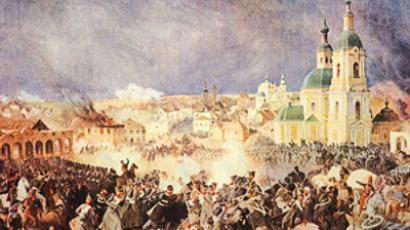Town concerned as Hitler’s childhood home might be sold
Adolf Hitler’s childhood home is a charming piece of property nestled in the middle of Braunau, a quiet Austrian town bordering Germany. The house looks solid and spacious and could soon end up on the market.
Hitler was born in Braunau 120 years ago and spent two years of his childhood in this house. The irony is that for the last three decades the house has been used as a workshop for the disabled – people Hitler would have murdered in his effort to create a race of supermen.
People with disabilities come here to weave carpets, make toys along with a variety of other products. All the handmade goods produced are then sold on the building's ground floor.
However, the charity is now planning to relocate, as the “inhabitants” of the property seem to have outgrown it. The question over who will get hold of the house is looming.
The landlord has refused to comment on the issue, but rumours say it could be sold by spring.
In the meantime, local authorities fear the property could end up in the hands of extreme right-wingers, who would then turn it into a shrine to Hitler's memory.
The mayor of Braunau said the town would like to buy the house to control its fate. Yet, it appears that as of now there is not enough money in the budget.
Anna Rosmus – a historian from another town where the Hitler family moved after living in Braunau, says she is sure that the neo-Nazis would not miss the opportunity to snap up the property if it becomes available.
"There are bus loads of Americans coming to these pilgrimage sites,” Rosmus says. “I have seen this happening for decades, this is where they flock while here, and money is not a problem for them. We can replace these kind of audiences with educated people, people who want to learn from the past."
Doctor Andreas Maislinger, chairman of the Austrian Holocaust memorial service, shares Rosmus’ view and says he would like to see this place become a museum, raising awareness about Nazi atrocities.
However, the mayor of the town has expressed his unwillingness for a museum, fearing Braunau could become a tourist destination solely associated with its most infamous son.
Just steps away from Hitler’s house and the nearby church where Hitler was baptized is a clothing shop which locals also consider to be a magnet for neo-Nazis.
"It should be closed. But it's difficult to close them because it is not forbidden," says Andreas Maislinger of the Austrian Holocaust Memorial Service.
Thoralf Meinl – the owner of the shop – is very cautious in his wording when it comes to talking about the shop’s political implications. He has already been to court to prove that the designs of the shop’s products have nothing to do with Nazi symbols.
"[People] come by car and drive 300 kilometers just to go shopping,” says Meinl. He makes sure to note that it is not because of the Nazi-like symbols that the clothes carry.
In the meantime, Braunau’s residents fear that their town could soon become a neo-Nazi mecca and people would start driving hundreds of kilometers just to view Hitler’s childhood house.













